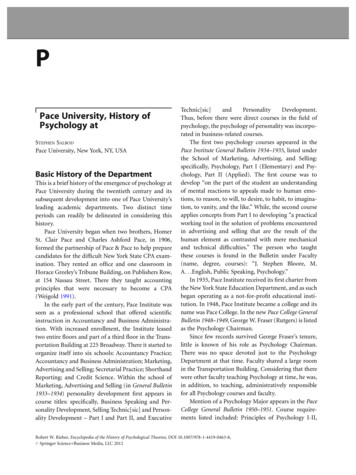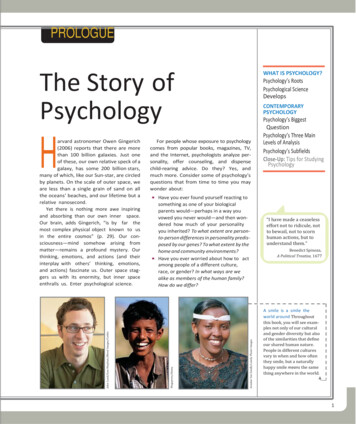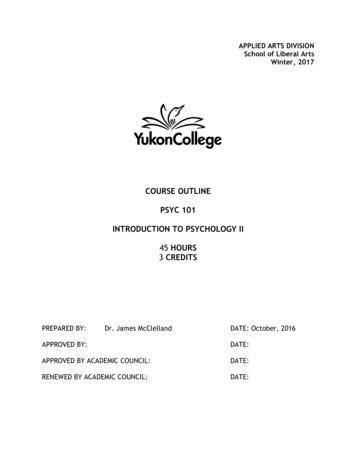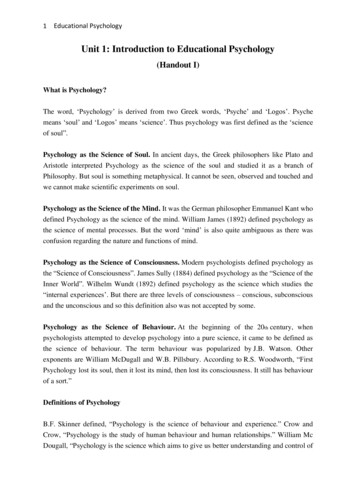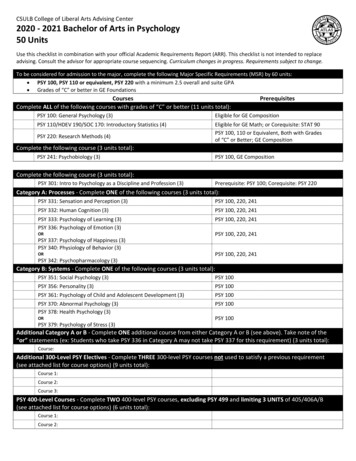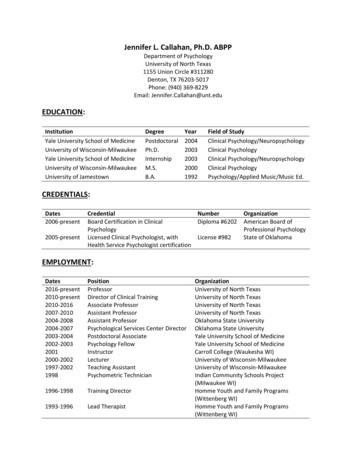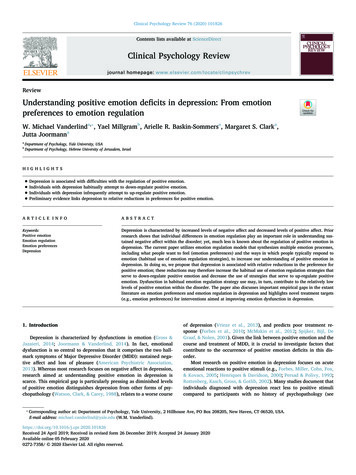
Transcription
Department of PsychologyDepartment ofPsychologyThe Psychology Department atthe University of KansasOur mission is to further our understanding of behavior and thephysiological, cognitive, and social processes associated with behavior.Psychology is also the profession that applies the science of behavior topractical problems, such as clinical, psychological disorders. This missionincludes the discovery and dissemination of principles pertaining to bothindividual and group psychological functioning and its development. Inaddition to doing this critical research, we expend great effort in trainingstudents at both the undergraduate and graduate levels so that thesestudents will be well equipped with the knowledge and methods thatwill place them at the forefront of progress across a broad range of thepsychological disciplines.Psychology Undergraduate ProgramStudents have many reasons for wanting to major in psychology. Someare simply fond of observing the behavior of others around them,fascinated with the results of their observations and curious to learnwhy people behave as they do. Some plan to become psychologiststhemselves or to enter one of the many professions where a backgroundin psychology can be useful -- such as, business, teaching, medicine,nursing, law, social work, the ministry, counseling, student services, childdevelopment, administration, or human resources.Psychology Graduate ProgramWe offer a single doctoral degree which may be earned in one of thefollowing programs: brain, behavior, and quantitative science, clinicalpsychology, or social psychology. Students admitted to one of theseprograms enter with the expectation of continuing graduate study throughthe Ph.D. as the department does not admit terminal master's students.A separate clinical child psychology training program has been developedfor doctoral students in an interdepartmental program with the Departmentof Applied Behavioral Science. For more information regarding the clinicalchild psychology program, please visit their website (https://ccpp.ku.edu/).Undergraduate ProgramsUndergraduate courses are designed as part of a general education, forstudents preparing for careers in professional fields, and for studentsmajoring in psychology, including those anticipating graduate work.Preparation for Graduate StudyStudents who plan to apply for graduate work in psychologyshould supplement their beginning course in methodology(PSYC 200/PSYC 201) and statistics (PSYC 210/PSYC 211) with alaboratory course (e.g., PSYC 618, PSYC 620, PSYC 622, PSYC 624,or PSYC 625). Methods (PSYC 200/PSYC 201) and Statistics(PSYC 210/PSYC 211) should be taken as early as possible in theundergraduate education. The laboratory course should be completedduring the junior or senior year.1Graduate ProgramsWe offer a single doctoral degree in psychology which may be earned inone of the following programs: brain, behavior, and quantitative science,clinical psychology, and social psychology. Please visit our PsychologyGraduate Program (http://psych.ku.edu/overview-phd/) webpage for moredetails.All of our programs boast distinguished and award-winning faculty,notable research publications, and a deep foundation in the historicalprogress of psychological advances.A separate clinical child psychology training program has been developedfor doctoral students in an interdepartmental program with the Departmentof Applied Behavioral Science. For more information regarding the clinicalchild graduate program, please visit their website (https://ccpp.ku.edu/).Non-Degree SeekingStudents who are interested in enrolling in graduate level coursework inthe Department of Psychology without formal admission to a graduateprogram at KU are encouraged to apply for graduate non-degree seekingstudent status. See the department’s Non-Degree Seeking (http://psych.ku.edu/overview/) webpage for further details.Questions regarding the our graduate programs can be directed to ourgraduate coordinator, Katie Williams, kfwilliams@ku.edu.CoursesPSYC 102. Orientation Seminar in Psychology. 1 Credits. SProvides an overview of the discipline of psychology. Emphasizesdeveloping an understanding of opportunities in psychology at theUniversity of Kansas, exploring service-learning options related to themajor, and helping students plan goals for their education through anunderstanding of their personal values and options within and outsidethe discipline. Open to KU-degree-seeking students only. Contact thePsychology Department to enroll in the course. Non-degree-seekingand non-KU students may enroll in the course by signing up with KUContinuing Education. Graded on a satisfactory/unsatisfactory basis.PSYC 104. General Psychology. 3 Credits. SI SA basic introduction to the science of psychology.PSYC 105. General Psychology, Honors. 3 Credits. SI SOpen to students in College or Departmental Honors programs or bypermission of instructor.PSYC 177. First Year Seminar: . 3 Credits. SIA limited-enrollment, seminar course for first-time freshmen, organizedaround current issues in psychology. May not contribute to majorrequirements in psychology. First year seminar topics are coordinated andapproved through the Office of First Year Experiences. Prerequisite: Firsttime freshman status.PSYC 199. Data I: Dealing with Data. 3 Credits. SData science is an interdisciplinary field that uses scientific methods,processes, algorithms and systems to derive knowledge and insights fromdata. This course teaches students the core concepts of inference andcomputing, working with real behavioral, economic, geographic, physical,social, and text data. Students obtain basic statistics training from acomputational perspective using simulation to answer questions, exploreproblems, and delve into social issues surrounding data analysis such asprivacy and design. (Same as ECON 199, POLS 199 and SOC 199.)PSYC 200. Research Methods in Psychology. 3 Credits. S
2Department of PsychologyAn examination of the scientific "ways of knowing" employed bypsychologists to discover the laws governing human behavior across awide domain. The focus of the course is upon these methods and thestatistical techniques that support them. Prerequisite: PSYC 104.PSYC 201. Research Methods in Psychology, Honors. 3 Credits. SAn examination of the scientific "ways of knowing" employed bypsychologists to discover the laws governing human behavior across awide domain. The focus of the course is upon these methods and thestatistical techniques that support them. Open to students in Universityand Departmental Honors programs or by permission of instructor. Notopen to students taking PSYC 200. Prerequisite: PSYC 104.PSYC 202. Study Abroad Topics in: . 1-6 Credits. SThis course is designed for the study of special topics in Psychologyequivalent to courses at the 100 and 200 level at KU. Coursework mustbe arranged through the Office of KU Study Abroad. May be repeated forcredit if content varies.PSYC 210. Statistics in Psychological Research. 3 Credits. SAn introduction to statistical concepts and methods as they relate toanalysis and interpretation of psychological data. Prerequisite: PSYC 104.PSYC 211. Statistics in Psychological Research, Honors. 3 Credits.SAn introduction to statistical concepts and methods as they relate toanalysis and interpretation of psychological data. Open only to studentin University and Departmental Honors programs or by permission ofinstructor. Not open to students who have taken PSYC 210. Prerequisite:PSYC 104.PSYC 250. Human Development. 3 Credits. SThis course examines the psychological, social, and physicaldevelopment of humans across the lifespan from conception throughinfancy, childhood, adolescence, adulthood and death. The coursewill explore the broad array of factors that contribute to developmentincluding cognitive, emotional, social, neurological, physical, genetic, andenvironmental influences. (Same as ABSC 250.) Prerequisite: PSYC 104or PSYC 105.PSYC 318. Cognitive Psychology. 3 Credits. SAn introduction to contemporary research and theory in human learningand memory, relevant perceptual processes, and higher functions such aslanguage. Prerequisite: PSYC 104.PSYC 319. Cognitive Psychology, Honors. 3 Credits. SOpen to students in University or Departmental Honors programs or bypermission of instructor. Prerequisite: PSYC 104.PSYC 320. Personality. 3 Credits. SA survey of personality theories, development, assessment and currentresearch. Prerequisite: PSYC 104.PSYC 321. Personality, Honors. 3 Credits. SHonors version of PSYC 320. Open to students in College orDepartmental Honors programs or by permission of instructor.Prerequisite: PSYC 104.PSYC 323. Philosophy of Psychology. 3 Credits. HRThe philosophy of psychology is a relatively new field of inquiry inphilosophy and so the question of what the philosophy of psychologyis remains an open question. In this course, we will understand thephilosophy of psychology in two ways. First, it is the study of thenature of psychology and the various capacities and mechanismsthat make cognition possible. We will consider whether there is aunique psychological level of explanation or whether psychologyultimately reduces to the brain. We will also explore various philosophicalpuzzles raised by consideration of psychological abilities like memory,attention, and emotion. Second, philosophy of psychology is a subfieldof philosophy of science, where we examine a particular science-here,experimental psychology-as a way to explore broader questions aboutwhat science is, how science explains phenomena, and how valuesintersect with its investigations. All of this makes it an exciting time tostudy the philosophy of psychology-as students in this course, student'sinterests will play a role in selecting topics and shaping the direction of ourinquiry. (Same as PHIL 323.)PSYC 333. Child Development. 3 Credits. SA survey course on the science and application of child and adolescentdevelopment; including physical, motoric, social, emotional, andcognitive changes from conception through adolescence. The coursecovers methods and theory, genetics, and may incorporate contenton aggression, morality, parenting, media, and peers. Prerequisite:PSYC 104.PSYC 334. Child Development, Honors. 3 Credits. SA survey course on the science and application of child and adolescentdevelopment; including physical, motoric, social, emotional, andcognitive changes from conception through adolescence. The coursecovers methods and theory, genetics, and may incorporate content onaggression, morality, parenting, media, and peers. Open to studentsin University or Departmental Honors Programs or by permission ofinstructor. Prerequisite: PSYC 104.PSYC 350. Psychological Disorders. 3 Credits. SA broad survey of psychopathology, with a focus on the primarysymptoms, causes, consequences, and treatments of its majormanifestations, including: anxiety disorders, mood disorders, traumarelated disorders, eating disorders, substance-use disorders, personalitydisorders, and psychotic-spectrum disorders. Relevant scholarship fromneuroscience, cognitive science, medicine, behavioral science, andsociocultural perspectives will be integrated throughout. Prerequisite:PSYC 104.PSYC 351. Psychological Disorders, Honors. 3 Credits. SOpen to students in College or Departmental Honors programs or bypermission of instructor. Prerequisite: PSYC 104.PSYC 360. Social Psychology. 3 Credits. SAn introduction to the psychology of social behavior. Systematicconsideration of such concepts as social influence, conformity anddeviation, social attitudes and prejudice, socialization and personality,communication and propaganda, morale, and leadership. Prerequisite:PSYC 104.PSYC 361. Social Psychology, Honors. 3 Credits. SAn introduction to the psychology of social behavior. Systematicconsideration of such concepts as social influence, conformity anddeviation, social attitudes and prejudice, socialization and personality,communication and propaganda, morale, and leadership. Open tostudents in University or Departmental Honors programs or by permissionof instructor. Prerequisite: PSYC 104.PSYC 370. Behavioral Neuroscience. 3 Credits. NA survey of topics related to the biological processes underlying behaviorin humans and in animals, including the physiology of neuronal andsynaptic, transmission, neurochemistry, and neuropharmacology.Selected topics within the area of behavioral neuroscience are alsocovered, such as motivation, appetite, reward, homeostasis, biologicalrhythms, addiction, aggression, stress, emotion, and sleep. Prerequisite:An introductory course in Psychology; an introductory course in Biology;and PSYC 200 or PSYC 201 and PSYC 210 or PSYC 211.PSYC 371. Behavior Neuroscience, Honors. 3 Credits. N
Department of PsychologyA survey of basic topics related to the biological processes underlyingbehavior in humans and in animals, including the physiology of neuronaland synaptic transmission, neurochemistry, and neuropharmacology.Selected topics within the area of behavioral neuroscience are alsocovered, such as motivation, appetite, reward, homeostasis, biologicalrhythms, addiction, aggression, stress, emotion, and sleep. Open tostudents in University or Departmental Honors programs or by permissionof instructor. Prerequisite: An introductory course in Psychology,an introductory course in Biology and PSYC 200 or PSYC 201 andPSYC 210 or PSYC 211.PSYC 375. Cognitive Neuroscience. 3 Credits. NA survey of topics related to the biological processes underlying cognitionin humans and in animals, including the physiology of neuronal andsynaptic transmission, neurochemistry, and functional neuroanatomy.Selected topics within the area of cognitive neuroscience also covered,such as sensory processing, hearing, vision, learning and memory,attention, motor control, language, hemispheric asymmetry, executivefunction, and neuroplasticity. Prerequisite: An introductory coursein Psychology; an introductory course in Biology; and PSYC 200 orPSYC 201 and PSYC 210 or PSYC 211.PSYC 380. Clinical Neuroscience. 3 Credits. NThe organization and function of the nervous system as it relates totopics of interest to psychologists, including pain, anxiety, stress, sleep,depression, schizophrenia, akinetic and dyskinetic movement disorders,and senile dementia. Prerequisite: An introductory course in Psychology,an introductory course in Biology, and PSYC 200 or PSYC 201 andPSYC 210 or PSYC 211.PSYC 381. Clinical Neuroscience, Honors. 3 Credits. NThe organization and function of the nervous system as it relates totopics of interest to psychologists, including pain, anxiety, stress, sleep,depression, schizophrenia, akinetic and dyskinetic movement disorders,and senile dementia. Open to students in University or DepartmentalHonors programs or by permission of instructor. Prerequisite: Anintroductory course in Psychology, an introductory course in Biology, andPSYC 200 or PSYC 201 and PSYC 210 or PSYC 211.PSYC 385. Social Neuroscience. 3 Credits. SThis course is designed to acquaint students with the Social Neuroscienceapproach as well as recent findings using this approach. The class willfocus on particular social phenomena and (a) evaluate the utility ofcurrent social neuroscience research examining these phenomena and(b) consider future experimental designs using the Social Neuroscienceapproach to further inform our understanding of each phenomenon.Prerequisite: An introductory course in Psychology; an introductory coursein Biology; and PSYC 200 or PSYC 201 and PSYC 210 or PSYC 211.PSYC 390. The Psychology of Aging. 3 Credits. SSocial, psychological, and economic adjustments required by aging;changes in cognition, role and personality necessitated by advancing age.Not open to students with credit in PSYC 691. Prerequisite: PSYC 104.PSYC 399. Data 2: Foundations of Data Science. 3 Credits. SData science empowers its users to provide data-drive solutions toproblems and questions in the world. This course provides foundationalskill and knowledge behind this power. This knowledge and skill includeslearning to formulate effective questions to answer with data, computerprogramming, data management and wrangling, exploratory data analysisand visualization, statistical inference and prediction, data-driven decisionmaking, and communication. (Same as ECON 399 and POLS 399.)Prerequisite: PSYC 199/POLS 199/ECON 199 or EECS 138; andPSYC 210 or MATH 365 or ECON 426 or POLS 306 or SOC 380 orMATH 101 or MATH 104 or MATH 115 or MATH 121.3PSYC 402. Study Abroad Topics in: . 1-6 Credits. SThis course is designed for the study of special topics in Psychologyequivalent to courses at the 300 to 600 level at KU. Coursework must bearranged through the Office of KU Study Abroad. May be repeated forcredit if content varies.PSYC 410. Intimate Relationships. 3 Credits. SA social psychological perspective on adult intimate relationships,examining friendship, dating, committed relationships, and thedissolution of committed relationships. Topics include romance, jealousy,self-disclosure, power, loneliness, and social support. Discussionof heterosexual and homosexual relationships, traditional forms(e.g., marriage) of relationships as well as alternative lifestyles (e.g.cohabitation) and gender-linked differences in relationships. (Same asWGSS 410.) Prerequisite: PSYC 104.PSYC 412. Introduction to Motivation and Emotion. 3 Credits. SAn examination of contemporary issues, theories, and research inmotivation and emotion. Prerequisite: PSYC 360 or PSYC 361, or consentof instructor.PSYC 415. Social and Cultural Sources of Self. 3 Credits. SAn interdisciplinary exploration of the social and cultural sources ofself-experience. The first part of the course emphasizes a generalprocess: how the development and experience of self, though it mightseem essentially personal, is shaped by social interaction. The secondpart of the course highlights particular cases: how self-experiencemay be constructed differently depending on the particular social andcultural settings a person inhabits. Cases include influences of gender,socioeconomic status, and age group on the construction of selfexperience within societies from around the world, and ethnic-identitygroups within the USA. Prerequisite: PSYC 104.PSYC 418. Introduction to Cognitive Science. 3 Credits. SExamines the data and methodologies of the disciplines that compriseCognitive Science, an inter-disciplinary approach to studying the mind andbrain. Topics may include: consciousness, artificial intelligence, linguistics,education and instruction, neural networks, philosophy, psychology,anthropology, evolutionary theory, cognitive neuroscience, humancomputer interaction, and robotics. (Same as LING 418, PHIL 418, andSPLH 418.) Prerequisite: Consent of instructor.PSYC 430. Cognitive Development. 3 Credits. SA basic survey course in the development of thinking and understandingin normal children. The course will cover Piaget's theory and informationprocessing theories at the advanced undergraduate level. Topics includeperception, attention, learning, memory, language, problem solving, andindividual differences from birth to the mid-teens. Prerequisite: PSYC 104or ABSC 160.PSYC 435. Psycholinguistics I. 3 Credits. S LFEA detailed examination of issues in the processing of language. Thecourse provides a survey of research and theory in psycholinguistics,reflecting the influence of linguistic theory and experimental psychology.Spoken and written language comprehension and language productionprocesses are examined. (Same as LING 435.) Prerequisite: Anintroductory course in linguistics or permission of instructor.PSYC 449. Laboratory/Field Work in Human Biology. 1-3 Credits. NLFEThis biological anthropology lab course builds upon concepts introducedin ANTH 150 and ANTH 304. It provides students with practical, handson experience in biological anthropology laboratory methods and theory.Topics include: genetics, osteology, forensic anthropology, modernhuman biological variation, primatology, paleoanthropology, and humanevolution. Students integrate their knowledge of human variation,
4Department of Psychologygenetics, and critical approaches to the concept of social and biologicalrace. For the final project, students analyze genetic markers using acommercial ancestry test. They will either be given anonymous data towork with, or, if they pay an optional laboratory fee, they can investigatetheir own genome for the final project. This fee for self-study is notrequired for full participation in the final project. (Same as ANTH 449,BIOL 449, and SPLH 449.) Prerequisite: Either ANTH 304, ANTH 340,Human Biology major, or permission of instructor.Psychology, Developmental Psychology, and Behavioral Neurosciencemajor requirements. Prerequisite: PSYC 200 or PSYC 201 or PSYC 210or PSYC 211 or consent of instructor.PSYC 453. Psychological Foundations of Musical Behavior. 3Credits. SStudy of human musical behavior, including basic psychoacousticphenomena, musical taste, functional music, musical ability, culturalorganization of musical sounds, and the affective response. Prerequisite:General Psychology, MEMT 370, or consent of instructor.PSYC 483. Undergraduate Internship in Psychology. 1-3 Credits. UPSYC 460. Honors in Psychology. 1-2 Credits. SA seminar for juniors and seniors in the Honors Program in Psychology.Students who have been admitted to the Honors Program in Psychologymay enroll for one credit for one or both semesters of their junior yearand are required to enroll for two credits for both semesters in their senioryear.PSYC 465. Stereotyping and Prejudice Across Cultures. 3 Credits.SThis course covers a variety of theoretical views concerning the origins ofstereotypes and the factors that maintain them, as well as how and whenthe revision of such beliefs take place. Analysis of various stereotypes(including gender and race) and the experience of prejudice across avariety of cultural contexts is examined. Many difficult social issues arediscussed in depth. Prerequisite: PSYC 360 or PSYC 361; or consent ofinstructor.PSYC 468. Psychology of Women. 3 Credits. SA survey of the psychological theories about women; similarities anddifferences in the behavior of women and men; the effects of biologicaland social factors on the behavior of women and men; and issues ofconcern to women of different races, sexual orientations, ages, and soforth. (Same as WGSS 468.) Prerequisite: Any previously completedcourse in PSYC or WGSS.PSYC 469. Seminar: . 1-5 Credits. UDiscussion of current problems in psychological theory and research.Prerequisite: PSYC 104.PSYC 470. Introduction to Contemporary Psychotherapies. 3Credits. SReview of current psychotherapies with special references to theirunderlying philosophies, theories of personality, techniques, andeffectiveness. Issues concerning the use of drugs in the treatment ofmental disorders are also reviewed. Prerequisite: PSYC 104.PSYC 472. Psychology of Sleep and Dreaming. 3 Credits. SThis course reviews recent evidence on the roles of dreaming anddreamless sleep. Psychological, developmental, personality, and socialpsychological aspects are considered. Prerequisite: PSYC 104.PSYC 480. Independent Study. 1-5 Credits. UInvestigation of a special research problem or directed reading in anarea not covered in regular courses. No more than 3 hours of PSYC 480may be counted toward the minimum hours required for the major.Prerequisite: Consent of instructor.PSYC 481. Research Practicum. 1-5 Credits. UGuided participation in ongoing research programs to augmentquantitative skills through direct practicum experience. No more than 3hours of PSYC 481 may be counted toward the Psychology minor or thePSYC 482. Sensation and Perception. 3 Credits. SIntroduction to human sensory and perceptual capabilities. Topics include:sensory systems, perceptual development, and perceiving color, objects,space, movement, sound, speech, touch, smell, and taste as well asvarious perceptual illusions. Prerequisite: PSYC 104.Students conduct psychology focused fieldwork in an organization relatedto their professional/career goals. Credit hours are determined on thebasis of 120 clock hours for 3 credit hours, 80 clock hours for 2 credithours, and 40 clock hours for 1 credit hour. An internship plan (contract)is developed by the student in conjunction with the student's academicadviser and signed off by the academic adviser and an authorized agentof the internship site. At the conclusion of the internship experience,the authorized agent of the internship site writes the academic adviserindicating that the student has met the goals of the internship plan andthe hours required. No more than 3 hours of PSYC 483 may be countedtoward the minimum hours required for the major. Prerequisite: Admissionto the Psychology major.PSYC 484. Classroom to Career. 3 Credits. SStudents who are preparing to enter the workforce are introduced tocurrent challenges and trends in professional development and workforcepsychology. In addition to discussion of interdisciplinary researchcentered around career management topics such as preventing burnout,recognizing and eliminating bias in interviews, or predictors of jobsatisfaction and productivity, emphasis is placed on the creation of a jobdossier and tools to help bridge skills from the classroom and their placein an individuals' career. Prerequisite: Junior or senior status.PSYC 492. Psychology and Social Issues. 3 Credits. SA study of psychological aspects of selected social issues incontemporary American society. Race relations and the civil rightsmovement. Political extremism. Public opinion and social change. Socialpsychological approaches to a variety of social problems. Prerequisite:PSYC 360 or 361, or consent of instructor.PSYC 499. Conceptual Issues in Psychology. 3 Credits. SThis course examines classic issues in psychology--free-will anddeterminism, nature and nurture, the mind-body problem, approaches tohuman action, cultural influences on psychological theories, the evolutionof intellectual paradigms, and inductive and deductive approaches tosocial scientific research--from multiple perspectives within psychologyand related social sciences. Prerequisite: PSYC 104 or equivalent.PSYC 500. Intermediate Statistics in Psychological Research. 3Credits. UA second course in statistics with emphasis on applications. Analysis ofvariance, regression, analysis, analysis of contingency tables; possiblyselected further topics. Prerequisite: Grade of B- or better in PSYC 210 orPSYC 211.PSYC 502. Human Sexuality. 3 Credits. SAn introduction to the field of human sexuality. Topics to be coveredinclude sexual anatomy and physiology, fertilization, pregnancy, birth andlactation, contraception, human sexual response, sexuality across thelife cycle, love, marriage, alternatives to marriage, sexual orientation, sexdifferences in behavior, parenthood, sexually transmitted diseases, sexand the law, and sex education. (Same as WGSS 502.) Prerequisite: Anyprevious coursework in either WGSS or PSYC.PSYC 513. Behavioral Economics. 3 Credits.
Department of PsychologyDecisions link our thoughts to our actions and as a result define whowe are and who people think we are. This makes decision making afundamental life skill. But, can we make better decisions? This course willintroduce you to the science of decision making that has developed asscholars including biologists, economists, mathematicians, philosophers,psychologists, and others have sought to answer this very question.Over the course of the semester we will examine what we have learnedso far such as how people predict and mispredict events, how peoplemake decisions and how their decisions can be quite irrational from oneperspective but simultaneously appear quite reasonable, how peoplebargain and why they sometimes choose to cooperate and other timesnot, and why negotiating can be so difficult. (Same as ECON 513.)Prerequisite: PSYC 104 or ECON 142; MATH 101 or MATH 103 orMATH 104, or eligibility for MATH 115 or MATH 125 or MATH 126.PSYC 518. Human Memory. 3 Credits. SIn-depth coverage of human memory phenomena, including phenomenaconcerning acquisition, storage and retrieval, unconscious forms ofmemory, memory monitoring and control, and practical aspects ofmemory such as autobiographical memory, mnemonic techniques andeyewitness memory. Prerequisite: PSYC 104.PSYC 520. Memory and Eyewitness Testimony in Children. 3Credits. SA review of the literature on the development of memory in youngchildren, and the implications of this research for understandingchildren's eyewitness testimony. The course will present currentresearch on children's long-term memory abilities, the impact of stresson recall performance, the effectiveness of various types of interviewingtechniques, and the suggestibility of children's recollections. Policy issuesand potential guidelines for the elicitation and evaluation of children'smemory reports in both clinical and legal arenas will be discussed.Prerequisite: PSYC 104 or ABSC 160, or consent of instructor.PSYC 521. Women and Violence. 3 Credits. SAn examination of research on women and violence, including rape,domestic violence, sexual harassment, stalking, and child sexual abuse.The nature, prevalence, causes, and consequences of violence againstwomen are discussed. (Same as WGSS 521.) Prerequisite: PSYC 104.PSYC 533. The Psychology of Addictive Behaviors. 3 Credits. SThe course will take an in-depth look at addiction processes using aninterdisciplinary perspective. The course will cover processes that leadto the development of substance use disorders, as well as advancedtopics in prevention and treatment. Addiction is a behavioral disorder,and the seminar will focus heavily on learning theory and conditioningprocesses that can yield problem substance use. Readings will be derivedfrom a variety
An introduction to the psychology of social behavior. Systematic consideration of such concepts as social influence, conformity and deviation, social attitudes and prejudice, socialization and personality, communication and propaganda, morale, and leadership. Open to students in Universit

